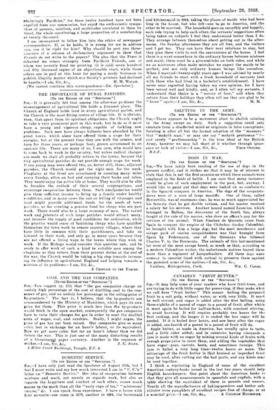THE IMPORTANCE OF RURAL PARISHES. [To THE EDITOR Or THE
" SPECTATOR.") SIR,—It is generally felt that among the after-war problems the encouragement of agricultural life holds a foremost place. The Church of England holds land in every agricultural parish, and the Church is the most fitting centre of village life. It is obvious, then, that apart from its spiritual obligations, the Church ought to take a very prominent part in this work, but to do so it must have a young and vigorous clergy, capable of tackling new problems. Such men have always hitherto been absorbed by the great towns, which alone have offered them a scope for their energies, but at the present time they are with the armies, and have for three years, or perhaps four, grown accustomed to an open-air life. There are many of us, I am sure, who would love to come back to work in the country, but unless radical changes are made we shall all probably return to the towns, because the tiny agricultural parishes do not provide enough scope for work. If one young man were offered two, or, better still, three, adjacent parishes, the Church would get the right men for the work. Chaplains at the front are accustomed to covering many miles every Sunday, often on foot and carrying their books and robes. They would enjoy the active life at home. They would also be able to broaden the outlook of their several congregations, and encourage co-operation between them. Such amalgamation would give them sufficient income to bring up a family under healthy conditions, and in many cases the sale or letting of vicarages and land might provide additional funds for the needs of town parishes, or for creating a pension fund for clergy who are past work. There would also be a large economy of men. The varied work and interests of such large parishes would attract many, and increase the supply of good candidates for ordination, while the practice would cease of banishing clergy who have qualified themselves for town work to remote country villages, where they 'have little in common with their parishioners, and take no interest in their work, and only go in many eases because they are not offered a living wage in the towns where they wish to work. If the Bishops would consider this question now, and be ready to offer work of such a kind to suitable men among the ellaplains as they return from their present duties at the end of the war, the Church would be taking a big step towards increas- ing its influence in agricultural England and helping towards a solution of its problems.—I am, Sir, &c., A CHAPLAIN TO THE FORCES.


























 Previous page
Previous page